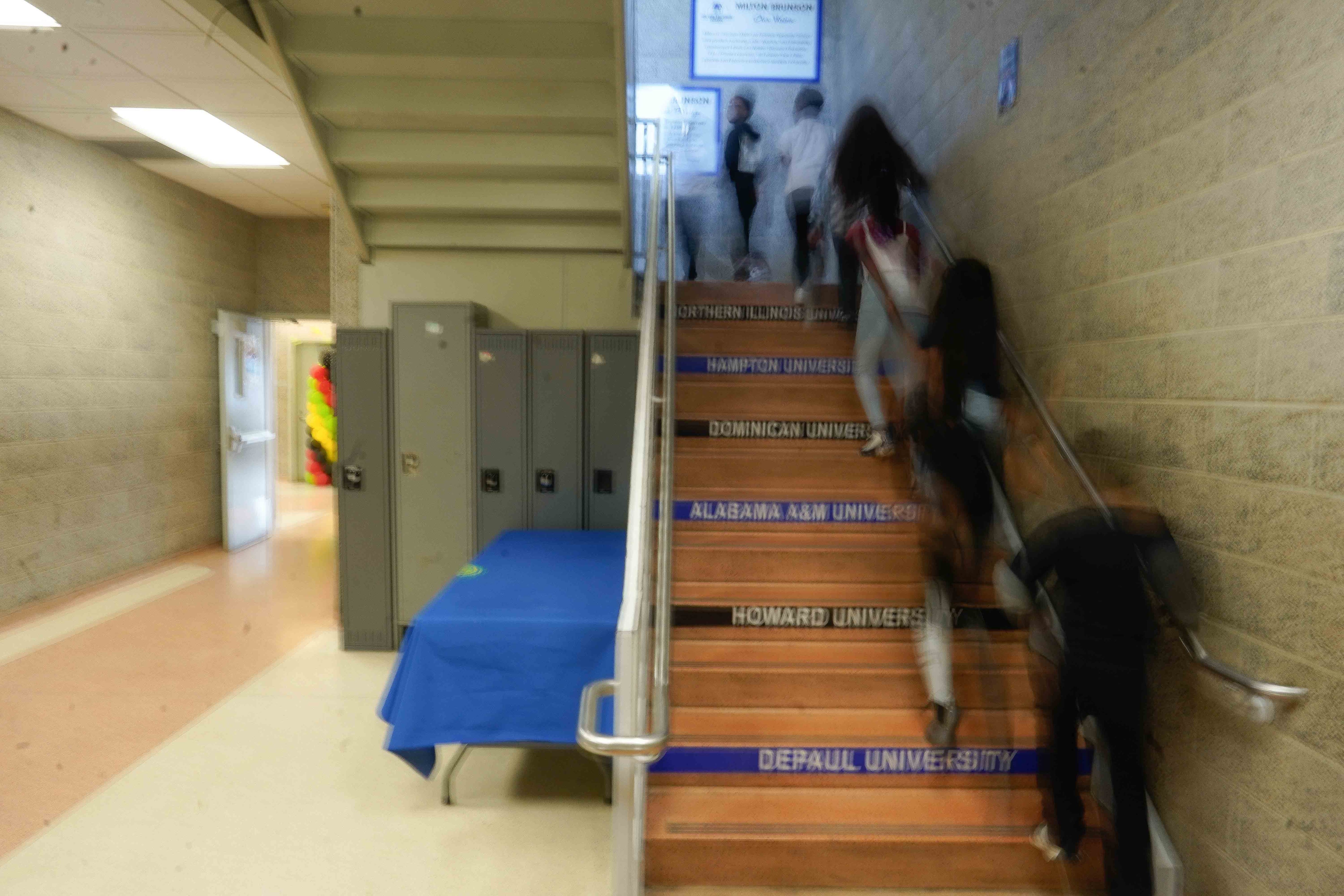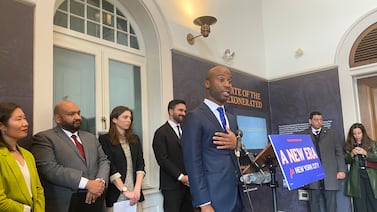Sign up for Chalkbeat Chicago’s free daily newsletter to keep up with the latest news on Chicago Public Schools.
Immigrant students and families are bracing for the unknown under President Donald Trump, who has promised the nation’s largest deportation operation — with Chicago as a target.
But in Chicago — a so-called sanctuary city — both city and schools officials have stressed that they will protect families of varying immigration statuses and will only cooperate with Immigration and Customs Enforcement officials, or ICE agents, if they have a judicial warrant.
Chicago Public Schools does not ask for or track students’ immigration status, and the previous school board approved a resolution reaffirming the district’s intention to protect immigrant students.
Still, families who are not legal residents are fearful of what the new presidential administration means for their future in Chicago — and the United States. CPS CEO Pedro Martinez told Chalkbeat Chicago that he believes schools “are the safest spaces” for children.
“I want families to not be afraid to send their children to school,” Martinez said. “We do not share information with ICE or the immigration department.”
Trump has already signed a series of executive orders in an attempt to tighten up immigration policies, including changing the definition of birthright citizenship to exclude the children of undocumented parents and legal immigrants in the country on temporary and getting rid of the “sensitive location” policy, which required U.S. Immigration and Customs Enforcement officials, known as ICE agents, to get approval to conduct arrests at or near schools and churches.
In a statement Tuesday night, CPS reiterated its stands not to share student information with ICE, “except in the rare case where there is a court order or consent from a parent or guardian.”
On Wednesday, the U.S Department of Justice ordered federal prosecutors to investigate state and local officials who do not follow Trump’s executive orders on immigration. Trump’s executive orders and proposed immigration policies are expected to face legal challenges.
“I know there’s just a lot of anxiety, and trust me, I feel it as well when I start hearing about, you know, all these things that [Trump] wants to change and the executive order signings,” Martinez said. “But ... it just takes years for these things to happen, and then some of these executive orders can’t even happen.”
So far, over 20 states, including Illinois, have sued the Trump administration in an attempt to block the changes to birthright citizenship.
Here’s what to know about schools and immigration policy.
Do I have to share my or my child’s immigration status with my child’s school?
No.
Chicago Public Schools does not ask families for immigration status and does not share student records with ICE officials unless agents have a court order or consent from the child’s parent or guardian, according to CPS.
The Illinois State Board of Education has advised school districts to change or modify enrollment policies that could reveal a child’s immigration status. For instance, school documents used to prove a child’s residency should not include information such as the child’s Social Security number. Schools also cannot prevent students from receiving benefits like pre-kindergarten or free or reduced price lunch if their application does not include a Social Security number.
“Here we have the protection of the state, and I want families to really understand that,” Martinez said. “That creates a much, much more protective layer for us … I don’t see our state, you know, giving up these protections.”
Can ICE agents enter school buildings?
Yes, but the bar to entry is high.
ICE agents have to provide their credentials, a reason for entry, and a criminal judicial warrant signed by a federal judge, in accordance with Chicago’s welcoming city ordinance and school board policy. Chicago Public Schools says ICE agents cannot enter a school with “an administrative warrant, ICE detainer, or a document from another agency enforcing civil immigration law. ”
A spokesperson for CPS said Trump’s executive orders do not change the district’s current policy or practice.
Martinez said the district has freed up three of its lawyers and also has a 24-hour hotline to assist school leaders with questions or concerns. If ICE agents show up to schools. CPS lawyers “can intervene or can assess, because they will review every judicial order to make sure it’s valid,” Martinez said.
If a parent is taken into custody by ICE agents, what can schools do to support students?
Martinez said the district is working with nonprofit organizations that work with schools to create “family plans” with families who might be worried about what to do if they are detained during the school day. The district can’t ask families for immigration information, so the district is leaning on help from community organizations that already work with and have built trust with school communities to create an extended list of relatives or guardians who can help if a parent is detained by ICE.
Martinez said that while parents have been detained during the school day, it is a relatively rare occurrence.
“That’s why we call it a family plan,” Martinez said. “It just gives us that extra assurance that there’s going to be somebody that we can contact in case. Hopefully, you know, it doesn’t happen.”
In the event that a family does not have an extended list of contacts, Martinez said schools already have emergency contacts for students for when a parent is late or doesn’t show up to pick their kids up.
What protections are there for teachers and school staff who are immigrants?
CPS employees are legally eligible to work in the United States, said Ben Felton, chief talent officer for Chicago Public Schools. That being said, Felton stressed that the district would not disclose any “sensitive personnel information” without a “valid legal request,” such as a subpoena, he said.
“We’re fiercely protective of our employees’ rights,” Felton said.
He also reiterated that staff has been trained on what to do if ICE agents show up to a school — including not allowing them inside without a judicial warrant.
The current Chicago Teachers Union contract says the district and school board cannot “inquire about or demand proof of immigration or citizenship status” of union members beyond what’s required by law. The contract also says that union members who are no longer allowed to work at CPS because of immigration status should be placed on unpaid leave if they are able to obtain proper work authorization within one year for non-tenured teachers and two years for tenured staff. That leave would then allow the employee to return to work without loss of seniority.
Are there resources at schools to help inform parents about their rights?
Chicago Public Schools have listed “Know Your Rights” forums hosted by local community and advocacy organizations on its website and information about the district’s policies.
The district has also trained teachers and staff on how they should interact with ICE agents, how to deal with ICE agents, and what to do if a child’s parent or legal guardian is arrested by ICE agents while a child is at school, as well as on students’ and parents’ rights. Martinez added that the district is making sure teachers and counselors know to create space for children “who just need to talk about it.”
Borderless Magazine, a local news organization that focuses on reporting about immigration, has put together a Know Your Rights guide to help Chicagoans navigate interactions with ICE agents.
Samantha Smylie is the state education reporter for Chalkbeat Chicago covering school districts across the state, legislation, special education and the state board of education. Contact Samantha at ssmylie@chalkbeat.org.
Reema Amin is a reporter covering Chicago Public Schools. Contact Reema at ramin@chalkbeat.org.






